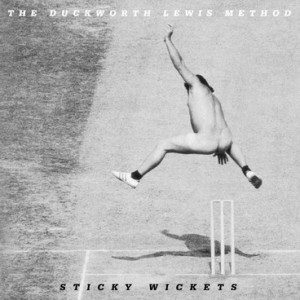The trick of the first album by The Duckwork Lewis Method, also known as The Divine Comedy’s Neil Hannon and Pugwash’s Thomas Walsh, was to get people over the notion that this was going to be a pop album devoted to the subject of the sport of cricket. The remit was a challenge for the duo, but that much more for the cricket-challenged countries (in my case America) who wouldn’t get the jokes or the lingo and would have to accept the collection based solely on songcraft.
And we did. Sure, we didn’t have a clue who Javed Miandad was, and we had to look up Shane Warne on Wikipedia, but we listened long enough to care about looking them up at all, and then we listened some more. I think I can say that the majority of us “yanks” who had the fortune of getting a hold of the album took it to heart quickly and thoroughly. But, would we have enough goodwill, and would Hannon and Walsh have enough material to have a second go? Apparently so, as we now have Sticky Wickets, their second test, in our hot little hands.
There are going to be reservations, and how could there not be? The shock and freshness of the first album is gone, as we know what these two are capable of in this context. We know there are jokes that will fly straight over our heads, and still this needs to be appreciated on a level beyond the humorous conceptual bent. So once you’ve traveled to Paris, you’re not dumbstruck by the Eiffel Tower anymore, but you can still appreciate it. That’s a little like how Sticky Wickets is, but don’t take this as a negative.
This kind of lush and orchestrated pop music doesn’t happen too often anymore, and any opportunity to have a new entry of its kind is welcomed. That the listener will still be humming the tracks weeks afterward is the surprise, though I guess it shouldn’t be. The exuberant “It’s Just Not Cricket,” the George Harrison-cum-Steely Dan vibe of “Out In The Middle,” the dead-on reinterpretation of ELO on “Third Man,” the electronic white-boy funk of “Line and Length,” and the melancholic ‘The Umpire” all have the ability to make you forget what the song is really about and just go with it. You do so willingly and gladly.
 If there is a knock I can level against the record, and it is a very small knock, it is that the structure is too close to the first. “Boom Boom Afridi” is a shout-out in the vein of “Meeting Mr. Miandad”; “Sticky Wickets” mixes the sport and sex euphemisms as “The Sweet Spot” did; an instrumental breaks sides one and two, you get the idea. You have to forgive the fellows though. Just try writing and recording an entire record based on nothing but the cult and culture of a specific sport and also forbid any sort of structural crutch to lean on. I’ve heard music like that and it ain’t pretty. Sticky Wickets winds up being very pretty, very memorable, and a good way to get through the summer.
If there is a knock I can level against the record, and it is a very small knock, it is that the structure is too close to the first. “Boom Boom Afridi” is a shout-out in the vein of “Meeting Mr. Miandad”; “Sticky Wickets” mixes the sport and sex euphemisms as “The Sweet Spot” did; an instrumental breaks sides one and two, you get the idea. You have to forgive the fellows though. Just try writing and recording an entire record based on nothing but the cult and culture of a specific sport and also forbid any sort of structural crutch to lean on. I’ve heard music like that and it ain’t pretty. Sticky Wickets winds up being very pretty, very memorable, and a good way to get through the summer.
I’ve heard that America’s The Baseball Project, featuring R.E.M.’s Peter Buck, Scott McCaughey, and Steve Wynn from the Dream Syndicate, works on a similar level but I haven’t actually heard The Baseball Project, and I’m not entirely sure I would want to. The key is always to be loving without being reverent or precious, otherwise you wind up wind up in a state of fanboy navel-gazing. God bless Terry Cashman, but I never ever need to hear “Talkin’ Baseball” again. To have me not only being an admirer of two records about cricket, but being an ardent promoter of them, must mean you’re doing something right, or something diehards would consider very wrong for the benefit of the unenlightened.
Whatever it is, it works. Too bad the guys can’t get a distributor for their efforts out here in the colonies, but if you have a shot at Sticky Wickets, give it a go.





Comments